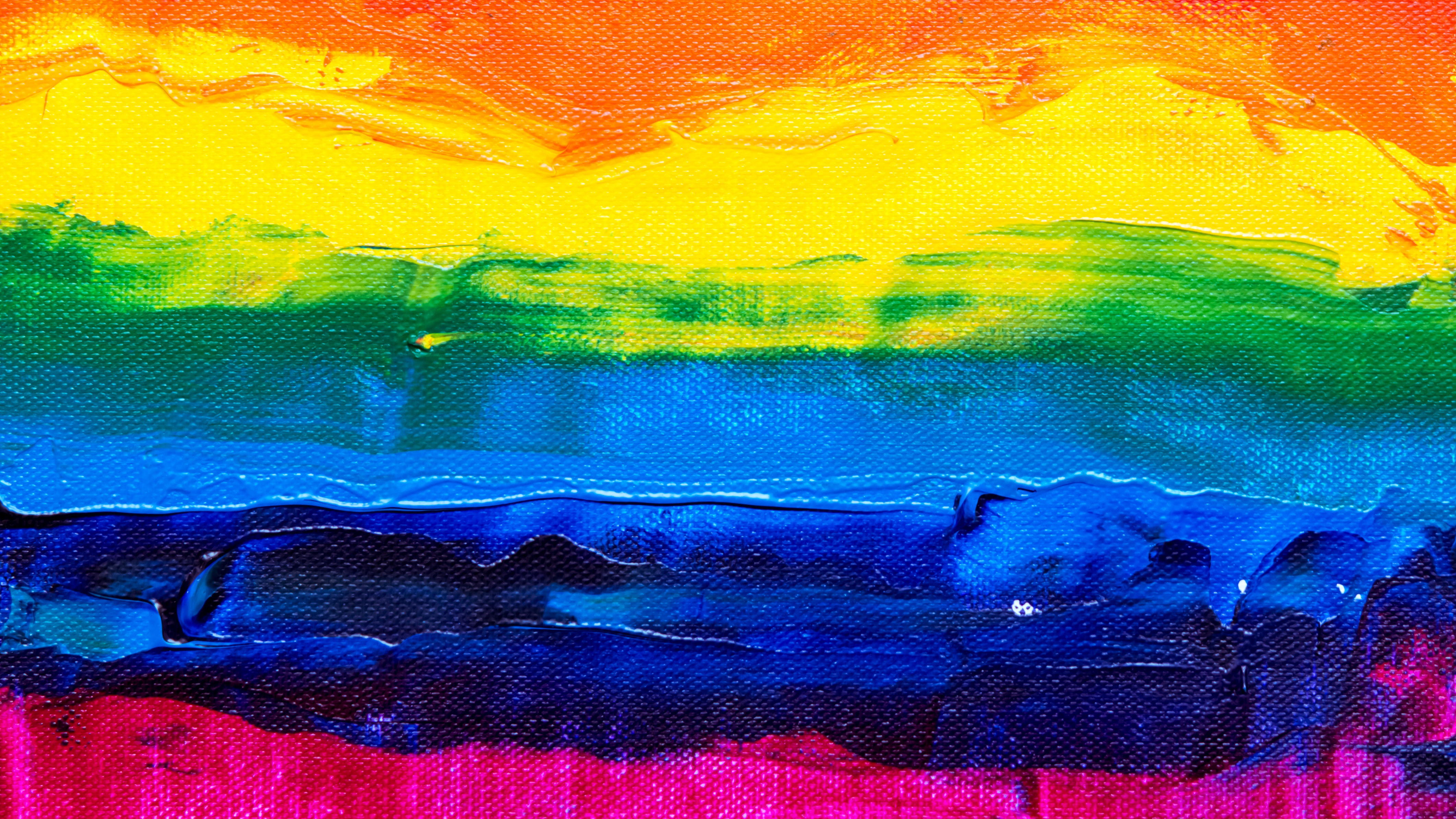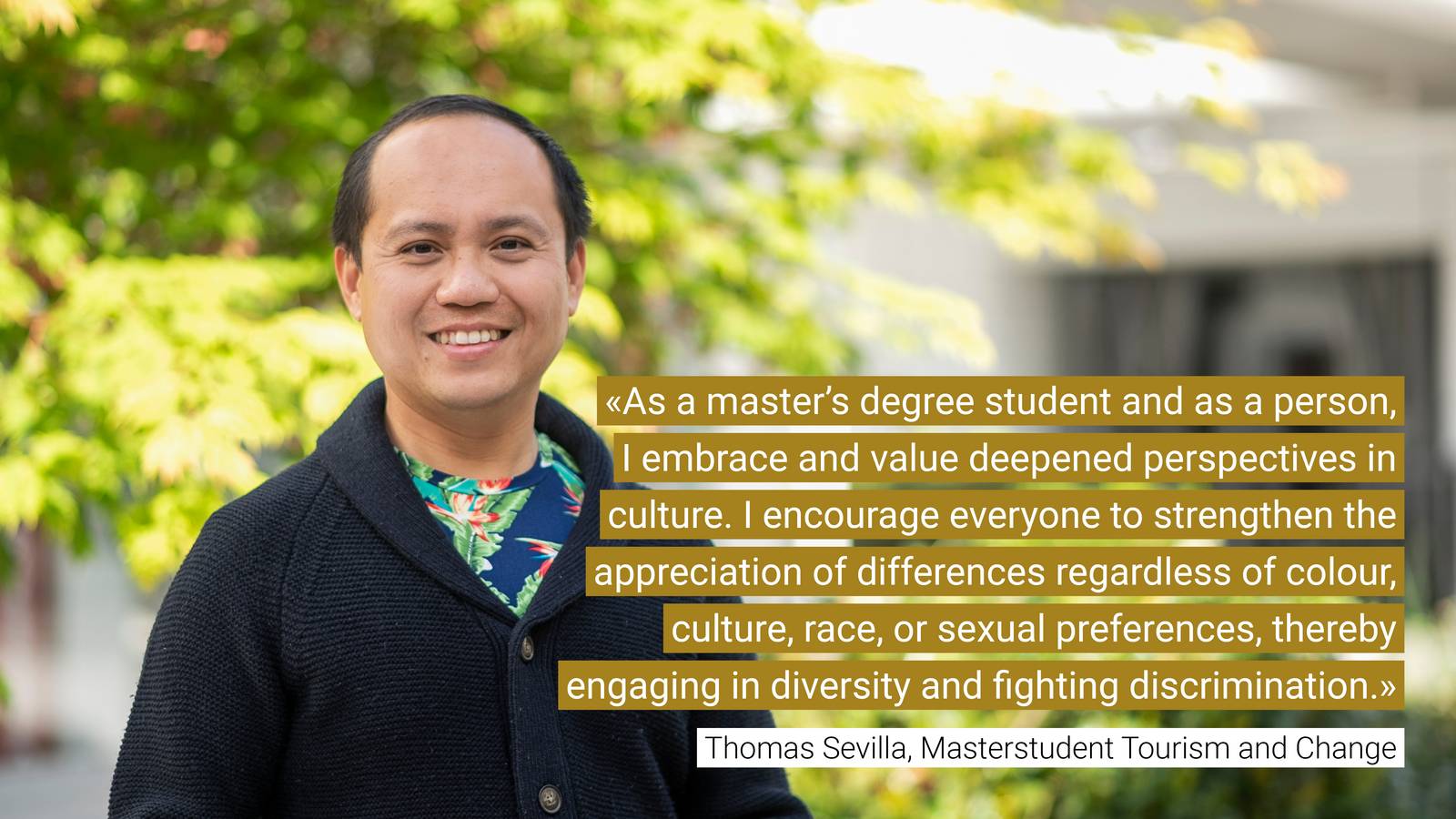On May 17th, the International Day against Homophobia, Transphobia and Biphobia will take place worldwide. IDAHOBIT (International Day Against Homophobia, Transphobia and Biphobia) aims to coordinate international events that raise awareness of LGBT rights violations and stimulate interest in LGBTQIA+ rights work. This day is an opportunity for all to engage in diversity and gender freedom.
We took this day as an opportunity to talk with one of our master’s students, Thomas Sevilla, about homophobia. Originally from the Philippines, Thomas Sevilla started his Master’s Studies in Business Administration, major Tourism and Change at the University of Applied Sciences of the Grisons two years ago and will be finishing this summer.
Andrea Zeller (AZ): What is your contribution so that the UAS Grisons is an equal opportunity and diversity promoting university?
Thomas Sevilla (TS): Generally, I have a global and open mindset. Thus, I represent our university or the brand with pride at my workplace or wherever I’m on the go. It may sound very cheesy, but that’s the way I think about it. We all have our contributions, but it wasn’t possible to organise things on site because due to the pandemic for a long time. And lastly, I think my contribution is that I am a person, who appreciates, embraces, and values deepened perspectives in culture. So generally, I think that’s my main contribution as a master’s student at and for the UAS Grisons.
AZ: How important do you think IDAHOBIT is?
TS: I think IDAHOBIT is an excellent platform for information, dissemination and increasing awareness against homophobia, transphobia and biphobia. With a global audience in over 130 countries and great importance, it can send a powerful message across to everyone. It could make a significant impact to help changing the mindset of individuals who have negative perceptions or prejudice against individuals or homosexuals and LGBT persons and discrimination against them. It encompasses a variety of unfavourable attitudes in general, adverse feelings towards homosexuality or those who identify themselves to be a member of the LGBTQ+ community. It could encourage to embrace sexual diversity and gender freedom in general. Therefore, I strongly encourage everyone to participate in this day to go rainbow, show your colours, and show your pride and support for the LGBTQIA+ community.
AZ: And is there anything you would like to highlight or miss in the debate about LGBTQI and homophobia?
TS: No, I guess that’s already it, so I don’t miss something. It’s not only being represented by the university, but it’s also being represented by many brands and employees around the globe, and I already feel that the university is taking part as a brand and as a community.
AZ: Where did you in the past, and do you still encounter homophobia, and in which forms?
TS: When I was still studying German in St. Gallen and another group of students explicitly said first that they disliked gays when we had to introduce ourselves. And since my features are feminine, maybe for them, it was apparent that I’m gay. So, they explicitly said that they were against it, that they did not want a group work with me.
I’ve been living in the canton of Thurgau for many years now, and it’s a rather conservative canton. I have personal experiences with residents who have a different cultural background than me who directly demonstrate their prejudice and discrimination towards me. I’m not discriminating against them; these are just my personal experiences. I’m very sorry if people will misinterpret me, that’s not my purpose. But how do you say, in a way, they stare at me from head to toe when I’m passing by or when I’m in the supermarket, as if I owe them something that can’t be repay or as if I have a disease that can’t be cure. And the worst part is as soon as I pass by, I would still hear their derogatory comments in their thunderous voice so that it’s clear for them and for me that I heard them. They still have the audacity to say something after doing such things. These are things I usually experience here in the canton of Thurgau. But maybe it’s different in major cities like Zurich, Geneva or Basel.
AZ: How do you deal with such encounters?
TS: At first, it hits me hard, and I take it personally or I feel sad or want to get even with them verbally, of course, not physically. But in the end, I accept that these people need information. They should broaden their minds. People should motivate and encourage them to embrace the diversity and different sexual preferences we have.
AZ: We have marriage for all, and soccer players coming out publicly. It seems that a lot is happening in society right now. Has everything already been achieved?
TS: Well, there are a lot of things going on. However, the primary concern I guess, is that the stigma is still there, and the acceptance, in general, is still at a minimum. So, as you have mentioned, we do have soccer players doing their coming outs; we voted yes for the marriage for all. These achievements are being celebrated and published lavishly on social media. However, there is still a long and challenging way to go on location especially in rural areas, until the acceptance kicks in.
AZ: In your opinion, what has the UAS Grisons already achieved here and in which areas do you still see the potential for development?
TS: In my opinion, the university has already made a significant contribution by creating a diversity unit. That’s a huge step already that there’s a unit for diversity, LGBTQ+ etc., and I think we need more such things to raise awareness in general. The university is already doing that; however, the involvement of the people is the challenge. We could organise all possible awareness projects or teams on-site or on social media. But still, if students don’t actively participate, everything will be useless, I guess. And maybe some of them might think that it’s none of their business in the first place, so why should they even care? But when people dig in and think about it, I think that now we have a perfect opportunity to contribute to these perennial problems that are shaping our lives and the lives to come. That’s why I also said yes to this interview because, again, this is my contribution in one way or another. I might be busy at the moment, but it’s really up to the people and how they act by being more engaging and participative with all these events we have organised for them.
AZ: How could everyone contribute to engaging for diversity and against discrimination, including homophobia?
TS: Now is a good time since the lectures are held on site again so we could motivate people to participate physically. We could go from room to room or building to building, informing students and lecturers about our projects. I just noticed from the social media of UAS Grisons that we have a lot of events like an after-work-drink party, so we could also involve the diversity theme at such an event. We could incorporate it in addition to what we are already celebrating and send the message around. We could do that since it is possible again to organise and hold things on site.
But generally, everyone can contribute by engaging in diversity and fighting discrimination. Firstly, by educating oneself and digging into the meaning and importance of these perennial topics. Secondly, by embracing and valuing different perspectives and cultures. We could observe or celebrate traditions, various holidays from other cultures and participate in events on-site and online against homophobia. And last but not least by deepening the appreciation of differences regardless of race, culture, colour or sexual preferences.
To end this enriching interview, my message would be that we could achieve our goals positively by thinking globally and acting locally. We could take current ideas globally and incorporate them into our local setting. Some ideas that could be organised in an international perspective but having the ideas and then uniquely personalising them to the local community’s needs, such as the UAS Grisons. We could achieve a lot more by doing so.
More information about the International Day against Homo-, Trans-, Biphobia on May 17th can be found here.


